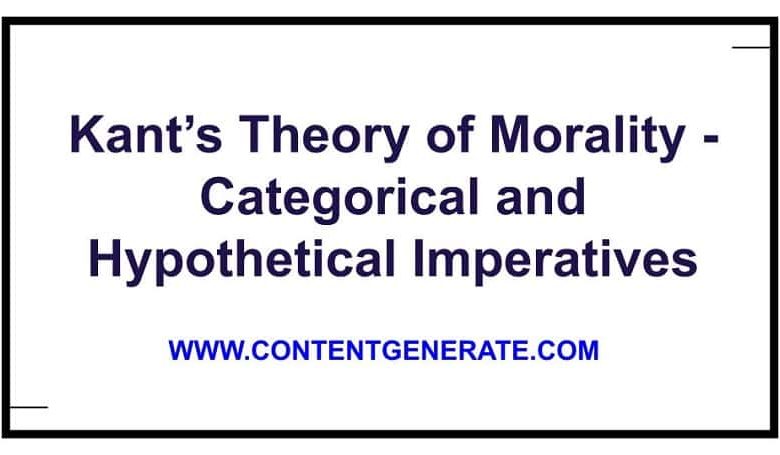
Categorical and Hypothetical imperative are two different rules suggested by Immanuel Kant in his theory of Goodwill and Moral duty. According to Kant, both imperatives act as the basis for the actions of a rational being in different situations.
In this article, the Kantian theory of goodwill and moral duty is discussed with a reference to both of the above-mentioned imperatives.
Contents
Who was Kant?
Immanuel Kant (1724–1804) was a German philosopher of the late 18th century. Kant’s most famous work is considered to be “Critique of Pure Reason” published in 1781. He received his doctorate degree in 1755 in philosophy. He taught metaphysics and logic as a professor at the University of Konigsberg. During this, Kant published a number of papers including ‘Theory of the Heavens, General Natural History and major works on philosophy.
What is Kantian Philosophy of Goodwill and Moral duty?
For Immanuel Kant, to act out of “goodwill” refers to acting out of a sense of moral obligation or duty. For example, you knew a person giving tuition fees to a poor school child. At the request of that person, you promised not to gossip about it ever in your life. Despite a strong urge to share what a good person he is, you do not disclose it to anyone to keep your promise.
This suggests there are many things that we do regardless of our desire to do otherwise. It’s simply because what we desire to do always may not be morally good. This is what Kant means by Moral duty. For him, a rational person always acts according to what is morally right, not what he/she desires.
Kant’s view of Goodwill
According to Kant, goodwill is the will of a rational being to fulfill moral duties irrespective of everything else. It is good not because of its effects or output, it’s good because of its willingness to do it. It does not need any qualification or reward in return to be good. Moreover, it’s being good does not depend upon the judgments of people (what others say).
Think of someone who enjoys teasing a lower grade employee: or somebody taking pleasure in violence; or a rapist terrorist whose courage allows him to kill people in broad daylight. In this case, the willingness is morally not good. To put it in simple words, the will behind this action is not goodwill. Happiness, pleasure, and courage in this case result in human anguish.
Thus goodwill is not good because of any attitudes, characteristics, or consequences. It’s good because of its nature in accord with a moral duty that relates to the greater good of the people.
Nature of duty from Kant’s perspective
According to Kant, a moral duty is of two types:
- categorical imperative
- hypothetical imperative
Categorical imperative
By categorical imperative, Kant means the moral laws which a person does irrespective of any regard to emotions, desires, or consequences. Kant calls such duties moral law. Kant argues one should act only according to the law that he/she would want at the same time to become a universal law. By this, one will always use humanity as an end rather than as a means to serve his/her own wishes, desires, etc. According to Kant, all rational beings must act as if they were lawmakers in the kingdom of universal ends.
Hypothetical imperative
According to Kant, Hypothetical imperative refers to the moral duty that a person does out of personal interest, emotions, desires, reward, etc. The act of the person, in this case, maybe the same or different from the one commanded by a standard law. The standard law here refers to the categorical imperative, a law that needs fulfillment irrespective of any personal interests, emotions, desires, attitudes, etc.
Let me give an example to make hypothetical imperative through an example. One may desire to become rich by following conventional moral laws but that can become a long-term struggle. In this case, the person acts in accord with the categorical imperative. If the same person, resorts to bank dacoity to become rich overnight, it would be an example of hypothetical imperative.
This suggests that the action emphasized in a hypothetical imperative may be or may not be aligned with the conventional moral law called the categorical imperative. In contrast to the categorical imperative, it applies to individuals rather than all people in society.
Dilemmas, Goodwill and Moral duty
Imagine that you have given shelter to some American people in your house in Taliban-ruled Afghanistan. Imagine then that a Taliban Commander knocks at your door and asks if you sheltered to Americans? What do we ought to do in light of Kant’s theory? Our obligation would be to avoid lying. Does this mean we are ethically supposed to disclose our secrets?


